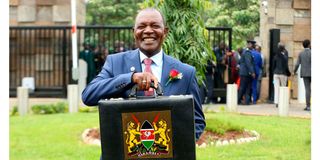Premium
Education, agriculture major winners in Ruto's Sh187bn mini-budget

National Treasury Cabinet Secretary Njuguna Ndung’u at Parliament Buildings for the reading of the 2023/24 Budget Statement on June 15, 2023.
University students have emerged as one of the biggest winners in President William Ruto’s first supplementary budget for the financial year 2023/24 after the National Treasury set aside an additional Sh29.31 billion to cater for scholarships.
In the revised plan, the Treasury has cut development spending by Sh41.96 billion but increased ministerial recurrent expenditure by Sh83.75 billion. The allocation for Consolidated Fund Services (CFS) that caters for pensions, interest on debt, and salaries for civil servants has been raised by Sh145.49 billion.
This has raised the total budget for financial year 2023/24 to Sh3.93 trillion, marking a significant increase from the original budget of Sh3.74 billion approved in June. This comprises of Sh2.41 trillion in ministerial expenditure and Sh1.13 trillion in CFS spending while county shareable transfer was retained at Sh385.42 billion.
“The total gross change of the ministerial estimates, county shareable transfer allocation, and CFS is Sh187.3 billion or a five percent increase. This is within the provisions of Article 223 of the Constitution,” Treasury said.
The education sector has been allocated a further Sh29.31 billion to cater for scholarships for first-year university students.
The funds will also cater for Higher Education Loans Board (Helb) disbursements to thousands of needy students and funding for the Open University, which was officially opened by Dr Ruto in August.
Treasury has also set aside a further Sh4.07 billion that will address the funding shortfall arising from the implementation of the new funding model for Technical and Vocational Education and Training (Tvet) centres and Sh4.49 billion for junior schools.
The Teachers Service Commission (TSC) has been allocated an additional Sh19.81 billion to cater for the hiring of thousands of new teachers. This has pushed TSC’s budget to Sh343.6 billion from the original estimates of Sh323.82 billion.
Farmers have received an additional Sh14.17 billion for the fertiliser subsidy programme and purchase of food stocks. Supplementary Budget I estimates submitted to the National Assembly by National Treasury Cabinet Secretary Prof Njuguna Ndung’u have revealed Dr Ruto’s immediate priorities after increasing the budget by Sh187.3 billion.
The State Department of Crop Development’s additional allocation of Sh14.17 billion brings its estimated total spend for the financial year 2023/24 to Sh60.17 billion.
“Increase is on account of provision for fertiliser subsidy, management of post-harvest losses, funds for the purchase of food reserve and provision for maintenance of dryers,” said Prof Ndung’u.
The subsidy on fertiliser is the only one retained by President Ruto in efforts to lower the cost of farming inputs. The President last year cut fertiliser prices to Sh3,500 from Sh6,500 for a 50-kilo bag. In August, the Head of State further cut the price further to Sh2,500 ahead of the short rains planting season in October.
The funds will also be used to stock the National Food Reserve with emergency stocks of key food commodities, especially maize. This comes two months after the Cabinet gave the nod for operationalisation of the newly promulgated Strategic Food Reserve Regulations, 2023.
“Under the framework, the government will purchase at least one million bags of maize to be maintained as part of our nation’s strategic food reserve. The off-take price for the 2023 crop will be announced in due course,” said the Cabinet in August.
Treasury has also allocated a further Sh3.86 billion as advance payment to coffee farmers. This comes after the Cabinet this month approved an advance payment of Sh4 billion to coffee farmers, which will see farmers earn Sh80 per kilogramme of cherry from the current Sh20.
This is an addition to Sh3 billion that had already been released to farmers.
“Increase is on account of provision of Sh4 billion for Coffee (Reforms) Cherry Revolving Fund,” said Prof Ndung’u.
Treasury has allocated an additional Sh3.54 billion to the State Department for Petroleum to settle arrears owed to oil marketing companies for fuel stabilisation.
By June, it was estimated that the government owed the firms about Sh45.82 billion in arrears for the fuel subsidy programme.
Oil marketing companies recently submitted a proposal to Treasury to convert the arrears into an interest-earning debt instrument like bonds to shore up their worsening cash flow.
“Increase is on account of provision for arrears for fuel stabilisation,” said the CS.
The State Department for Roads has taken a major hit in Dr Ruto’s new spending plan after its budget was slashed by Sh20.74 billion as the Head of State scaled back on development projects.
The government’s affordable housing programme has also taken a hit after the budget for the State Department for Housing and Urban Development was slashed by Sh13.31 billion in the mini-budget.
Other major losers include the National Treasury, whose spending has been reduced by Sh18.52 billion and the State Department for Medical Services which has taken a hit of Sh5.45 billion.





